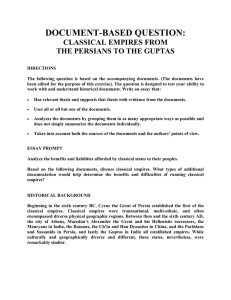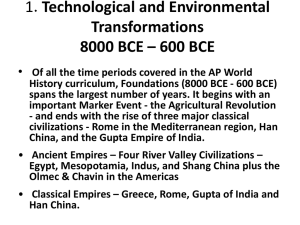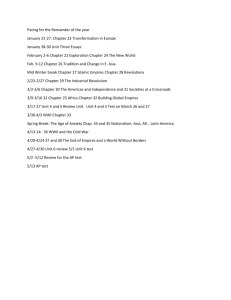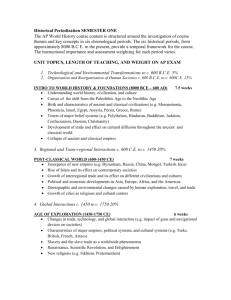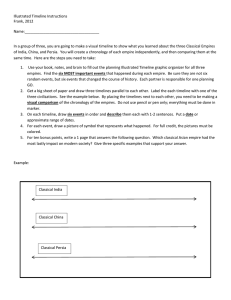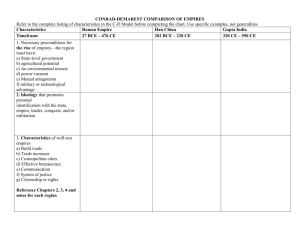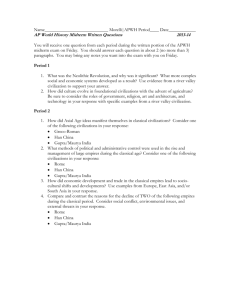DOCUMENT-BASED QUESTION: CLASSICAL EMPIRES FROM THE PERSIANS TO THE GUPTAS
advertisement
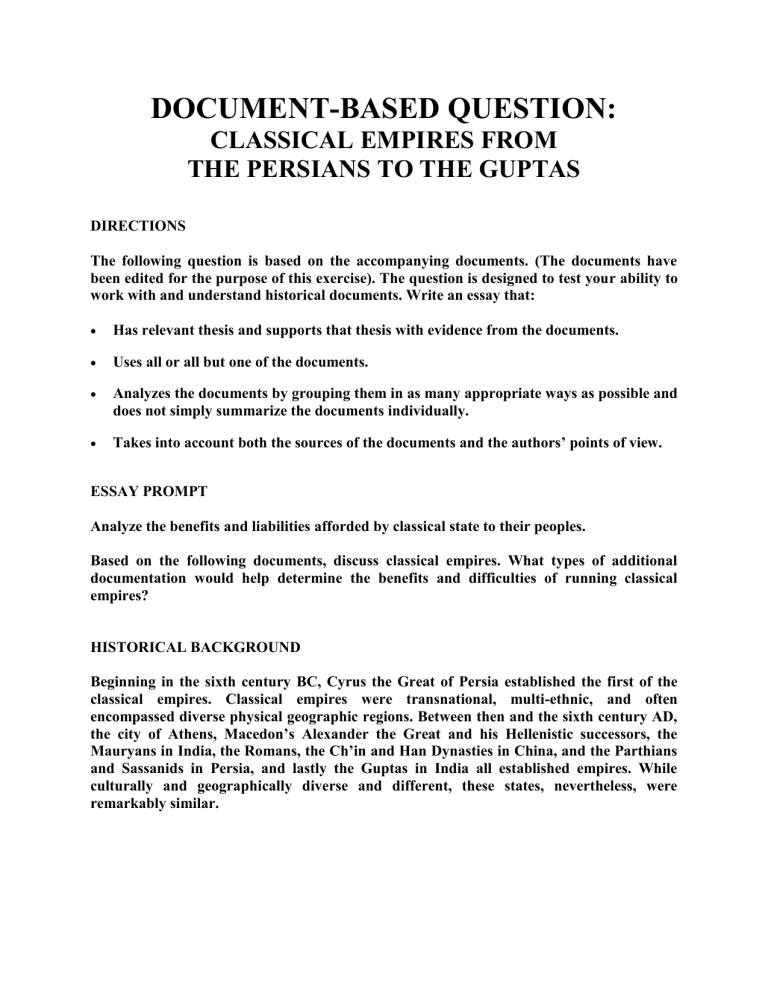
DOCUMENT-BASED QUESTION: CLASSICAL EMPIRES FROM THE PERSIANS TO THE GUPTAS DIRECTIONS The following question is based on the accompanying documents. (The documents have been edited for the purpose of this exercise). The question is designed to test your ability to work with and understand historical documents. Write an essay that: Has relevant thesis and supports that thesis with evidence from the documents. Uses all or all but one of the documents. Analyzes the documents by grouping them in as many appropriate ways as possible and does not simply summarize the documents individually. Takes into account both the sources of the documents and the authors’ points of view. ESSAY PROMPT Analyze the benefits and liabilities afforded by classical state to their peoples. Based on the following documents, discuss classical empires. What types of additional documentation would help determine the benefits and difficulties of running classical empires? HISTORICAL BACKGROUND Beginning in the sixth century BC, Cyrus the Great of Persia established the first of the classical empires. Classical empires were transnational, multi-ethnic, and often encompassed diverse physical geographic regions. Between then and the sixth century AD, the city of Athens, Macedon’s Alexander the Great and his Hellenistic successors, the Mauryans in India, the Romans, the Ch’in and Han Dynasties in China, and the Parthians and Sassanids in Persia, and lastly the Guptas in India all established empires. While culturally and geographically diverse and different, these states, nevertheless, were remarkably similar. Document 1 Pericles’ Funeral Oration, Athenian Leader during Peloponessian War, 430 BC “Our constitution does not copy the laws of neighboring states; we are rather a pattern to others. Its administration favors the many instead of the few. If we look to the laws, they afford equal Justice; if to social standing advancement in public life falls to reputation for capacity, class considerations not being allowed to interfere with arete, nor does poverty bar the way. If a man is able to serve the state, he is not hindered by the obscurity of his condition fear is our chief safeguard, teaching us to obey those in office and the laws.” Document 2 Han fei tzu, Legalist philosopher and advisor to Ch’in kings, 5th century BCE “If the laws are weak, so is the kingdom. The ruler alone should possess the power; if the ministers shut out the ruler, then he loses the effectiveness of his position. If they control wealth and resources, he loses the means of dispensing bounty. If they issue orders as they please, he loses the means of command. If they are able to carry out righteous deeds in their own name, he loses his claim to enlightenment. And if they can build up factions of their own, he loses his supporters. All these are rights that should be exercised by a ruler alone; they should never pass into the hands of his ministers.” Document 3 Tacitus, Roman historian, from Agricola, biography of the governor of Britain, AD 78-84 “People that are scattered and uncivilized are quick to fight. To make them ready to accept peace and leisure he had to prove how pleasant these are, so he encouraged individuals and communities alike, and gave them official assistance to build temples, town centers, and houses, praising all who cooperated, and rebuking anyone who was reluctant. He went on to make sure sons of the chieftains had a proper education. Consequently, men who had a short time before refused to learn Latin were now keen to speak it fluently. In their simplicity they called it civilization – it was in fact merely one method of keeping them quiet.” Document 4 Aelius Aristides, Greco-Roman writer, his public writings, 150 CE “Most wonderful of all is your noble idea of citizenship. For you have divided all the people of the empire into two groups. The more cultured, better born, and more influential everywhere you have declared Roman citizens. Everything lies open to everybody, and no one who is worthy to be trusted with public office is considered a foreigner. There are many people in each city who are citizens. You have no need to keep troops in these cities; the most influential men everywhere keep watch over their own native places for you. You have a double hold on these cities – from Rome and through the Roman citizens in each.” Document 5 Megasthenese, Seleucid (Greek) Ambassador to Chandragupta Maurya, 305 BCE, his comments on India “The imperial army is divided into four parts including 600,000 foot soldiers, cavalry of 30,000, 9,000 war elephants utilizing 36,000 men and 10,000 war chariots with contingents of 24,000. From the capital a war council of thirty officials and six committees oversees war plans the soldiers lead a life of supreme freedom and enjoyment. They have only military duties. They await and train for war.” Document 6 The Japanese Reform Edict of Taika, 646 CE “The capital shall be placed under an administrative system. Governors and prefects shall be appointed. Barriers and outposts shall be erected, and guards and post horses for transportation and communication purposes shall be provided. Furthermore belltokens shall be made and mountains and rivers shall be regulated. It is hereby decreed that the household registers, tax registers, and rules for allocation and redistribution of land shall be established. In each village there shall be appointed an alderman. He shall be responsible for the maintenance of the household registers, the assigning of sowing of crops and cultivation of mulberry trees, prevention of offenses, and requisitioning of taxes and forced labor. Old taxes and forced labor shall be replaced by a system of commuted taxes based on the size of rice fields. These taxes shall consist of fine silk. A separate household tax shall also be levied and each shall pay in cloth and salt.” Document 7 Plutarch, Greco-Roman historian, 1st/2nd century CE, from his biography on Pericles, ruler of Athens during the 5th century BCE “Those who were of the right age and were strong could earn generous pay from public funds for military service, but as regards the artisans, he did not want them to be without share in the city’s profits, so he put forward before the people ambitious building projects and plans for constructions which would provide work for many different crafts. In this way the population, which stayed at home would have cause to benefit from and have a share in public funds no less than those who paid a salary manned the ships, carried out garrison duties, went on campaign, or administered the city as paid officials.” Document 8 Inscription on a Chinese tower Built by Chin shih huang-di, 3rd century BCE A new age is inaugurated by the Emperor; Rules and measures are rectified, Farming is encouraged, secondary pursuits discouraged, Tools and measures [weights and coins] are made uniform, The written script is standardized; For our Emperor in accordance with the time Has regulated local customs, Made waterways and built roads, Divided up the land High and low, noble and humble, None dare overshoot the mark; The common people know peace And have laid aside weapons and armor; There are no robbers or thieves; Men delight in his rule, All understanding the law and discipline. The universe entire Is our Emperor's realm.
